| Listing 1 - 6 of 6 |
Sort by
|
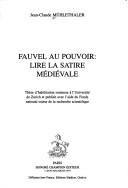
ISBN: 2852032201 9782852032200 Year: 1994 Volume: 26 Publisher: Paris : Editions Honoré Champion,
Abstract | Keywords | Export | Availability | Bookmark
 Loading...
Loading...Choose an application
- Reference Manager
- EndNote
- RefWorks (Direct export to RefWorks)
Medieval satire --- Middeleeuwse satire --- Satire [Medieval ] --- Satire [Middeleeuwse ] --- Satire médiévale --- Verse satire, French --- Roman de Fauvel. --- Non-fiction --- Old French literature --- Civilization, Medieval, in literature. --- History and criticism. --- Roman de Fauvel --- Verse satire, French - History and criticism. --- Roman de fauvel --- Satire medievale
Book
ISBN: 9780888444851 0888444850 Year: 2018 Publisher: Toronto Published for the Centre for Medieval Studies by the Pontifical Institute of Medieval Studies
Abstract | Keywords | Export | Availability | Bookmark
 Loading...
Loading...Choose an application
- Reference Manager
- EndNote
- RefWorks (Direct export to RefWorks)
"The fifteen medieval Latin parodies edited in this volume are among the liveliest from a lively age of satire and literary mischief. That medieval clerical life was often high-spirited and entertaining was a secret the official Church was not eager to reveal. Thus, apart from a few exceptions, such as the drinking songs of the Carmina Burana (famously and anachronistically revived by Carl Orff), the medieval Latin of religion and the schools is rarely regarded as a repository of madcap humour. Instead it typically gives the impression of a medium of sombre and utilitarian literature, the dryness relieved by occasional flights of sophisticated love poetry. As the lingua franca of the medieval world, and above all of the medieval Church, Latin can certainly lay claim to innumerable works that prize worthiness above entertainment value. But the examples of clerical and scholarly merrymaking edited in this book--representatives of a widespread tradition--are testimony that the educated were just as fond of revelry as their more secular and plebeian contemporaries."--
Parodies, Latin (Medieval and modern) --- Verse satire, Latin (Medieval and modern) --- Parody --- Satire, Medieval --- Latin verse satire, Medieval and modern --- Medieval Latin verse satire --- Modern Latin verse satire --- Latin parodies, Medieval and modern --- Medieval satire --- Comic literature --- Literature, Comic --- Travesty --- Parodies, Latin (Medieval and modern). --- Verse satire, Latin (Medieval and modern). --- Parody. --- Satire, Medieval. --- Latin poetry, Medieval and modern --- Latin wit and humor, Medieval and modern --- Satire --- Burlesque (Literature) --- Caricature
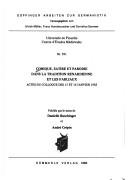
ISBN: 3874526119 Year: 1983 Volume: vol 391 Publisher: Stuttgart Kümmerle Verlag
Abstract | Keywords | Export | Availability | Bookmark
 Loading...
Loading...Choose an application
- Reference Manager
- EndNote
- RefWorks (Direct export to RefWorks)
Poetry --- Old French literature --- Comparative literature --- Comic, The, in literature --- -Fabliaux --- -Parody --- -Reynard the Fox (Legendary character) --- -Satire, Medieval --- -Tales, Medieval --- -Medieval tales --- Medieval satire --- Reinaert de Vos (Legendary character) --- Reinke de Vos (Legendary character) --- Renart (Legendary character) --- Legends --- Comic literature --- Literature, Comic --- Travesty --- Satire --- Burlesque (Literature) --- Caricature --- French poetry --- Tales --- Congresses --- History and criticism --- -Congresses --- Fabliaux --- Parody --- Reynard the Fox (Legendary character) --- Satire, Medieval --- Tales, Medieval --- Congresses. --- Medieval tales --- History and criticism&delete& --- Reinart de Vos. --- Fables. (Congrès. Amiens. 1983) --- Renart (Roman de). --- Fabels. (Congres. Amiens. 1983)
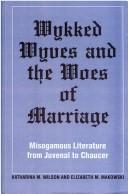
ISBN: 0585068836 9780585068831 079140062X 1438424191 9781438424194 Year: 1990 Publisher: Albany, NY : State University of New York Press,
Abstract | Keywords | Export | Availability | Bookmark
 Loading...
Loading...Choose an application
- Reference Manager
- EndNote
- RefWorks (Direct export to RefWorks)
The distrust and hatred of matrimony is a recurring theme in Western literature. In this volume, the authors show that in their repeated imagery, continuous themes, and rhetorical devices, misogamous texts closely parallel and reflect economic and demographic shifts, and theological and legal innovation. Analysis of the literature demonstrates a link between the growing secularism and careerism of the late middle ages and the reduction of women's social status and public options.
Literature, Medieval --- Satire, Medieval --- Marriage customs and rites, Medieval. --- Marriage in literature. --- Misogyny in literature. --- Wives in literature. --- Women in literature. --- Woman (Christian theology) in literature --- Women in drama --- Women in poetry --- Medieval marriage customs and rites --- Medieval satire --- History and criticism. --- Juvenal --- Giovenale, D. Giunio --- Juvenalis, Decimus Junius --- Juvénal --- Influence. --- Marriage customs and rites, Medieval --- Marriage in literature --- Misogyny in literature --- Wives in literature --- Women in literature --- 82.04 --- 82:396 --- 82:396 Literatuur en feminisme --- Literatuur en feminisme --- 82.04 Literaire thema's --- Literaire thema's --- History and criticism --- Iuvenalis, Decimus Iunius --- Iuvenalis, Decimus Junius --- Giovenale --- Iouvenalēs --- I︠U︡venal, D. I︠U︡nīĭ --- Yuvenalis --- Giovenale, Decimo Giunio
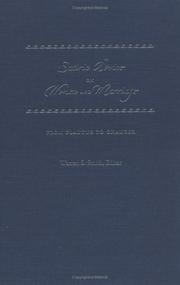
ISBN: 128259401X 9786612594014 0472026291 9780472026296 9781282594012 6612594012 0472114263 9780472114269 Year: 2005 Publisher: Ann Arbor : University of Michigan Press,
Abstract | Keywords | Export | Availability | Bookmark
 Loading...
Loading...Choose an application
- Reference Manager
- EndNote
- RefWorks (Direct export to RefWorks)
Satire, Latin --- Satire, Greek --- Women and literature --- Satire, Medieval --- Marriage in literature. --- Women in literature. --- Woman (Christian theology) in literature --- Women in drama --- Women in poetry --- Medieval satire --- Literature --- History and criticism. --- History --- Chaucer, Geoffrey, --- Chaucer, Jeffrey, --- Chʻiao-sou, Chieh-fu-lei, --- Chieh-fu-lei Chʻiao-sou, --- Choser, Dzheffri, --- Choser, Zheoffreĭ, --- Cosvr, Jvoffrvi, --- Tishūsar, Zhiyūfrī, --- Political and social views. --- Characters --- Women. --- Marriage in literature --- Women in literature --- History and criticism --- Chaucer, Geoffrey --- Political and social views --- Women --- Satire [Latin ] --- Satire [Greek ] --- To 1500 --- Satire [Medieval ] --- Satire latine --- Satire grecque --- Chaucer, Geoffrey (1340?-1400) --- Femmes et littérature --- Satire médiévale --- Femmes --- Mariage --- Critique et interprétation --- Pensée politique et sociale --- Personnages --- Histoire --- Avant 1500 --- Histoire et critique --- Dans la littérature
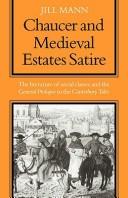
ISBN: 052120058X 0521097959 0511552971 0511864477 9780521200585 Year: 1973 Publisher: Cambridge : Cambridge University Press,
Abstract | Keywords | Export | Availability | Bookmark
 Loading...
Loading...Choose an application
- Reference Manager
- EndNote
- RefWorks (Direct export to RefWorks)
This book is an attempt to discover the origins and significance of the General Prologue-to the Canterbury Tales. The interest of such an inquiry is many-sided. On the one hand, it throws light on the question of whether `life' or 'literature' was Chaucer's model in this work, on the relationship between Chaucer's twenty-odd pilgrims and the structure of medieval society, and on the role of their `estate' in determining the elements of which Chaucer composes their portraits. On the other hand, it makes suggestions about the ways in which Chaucer convinces us of the individuality of his pilgrims, about the nature of his irony, and the kind of moral standards implicit in the Prologue. This book suggests that Chaucer is ironically substituting for the traditional moral view of social structure a vision of a world where morality becomes as specialised to the individual as his work-life.
Chaucer, Geoffrey --- Estates (Social orders) --- Prologues and epilogues --- Christian pilgrims and pilgrimages in literature --- Satire, Medieval --- Tales, Medieval --- Social history --- Social problems in literature --- Social classes in literature --- Satire --- History --- History and criticism --- Religious aspects --- Chaucer, Geoffrey, --- Political and social views --- -Social classes in literature --- -Social problems in literature --- -Satire --- -Prologues and epilogues --- -Estates (Social orders) --- -Descriptive sociology --- Social conditions --- Sociology --- Medieval satire --- Commons (Social order) --- Feudalism --- Epilogues --- Postscripts (Epilogues) --- Prefaces --- Comic literature --- Literature --- Wit and humor --- Invective --- Medieval tales --- -Chaucer, Geoffrey --- -Political and social views --- -History and criticism --- Christian pilgrims and pilgrimages in literature. --- Social problems in literature. --- Social classes in literature. --- History and criticism. --- Religious aspects. --- Political and social views. --- -Commons (Social order) --- Descriptive sociology --- Chaucer, Jeffrey, --- Chʻiao-sou, Chieh-fu-lei, --- Chieh-fu-lei Chʻiao-sou, --- Choser, Dzheffri, --- Choser, Zheoffreĭ, --- Cosvr, Jvoffrvi, --- Tishūsar, Zhiyūfrī, --- Arts and Humanities --- Estates (Social orders) - England - History - To 1500 --- Prologues and epilogues - History and criticism --- Satire, Medieval - History and criticism --- Tales, Medieval - History and criticism --- Social history - Medieval, 500-1500 --- Satire - Religious aspects --- Chaucer, Geoffrey, - -1400 - Canterbury tales - Prologue --- Chaucer, Geoffrey, - -1400 - Political and social views --- CHAUCER (GEOFFREY), d. 1400 --- LITERATURE AND SOCIETY --- CANTERBURY TALES --- PROLOGUE --- ENGLAND --- Chaucer, Geoffrey, - -1400
| Listing 1 - 6 of 6 |
Sort by
|

 Search
Search Feedback
Feedback About
About Help
Help News
News